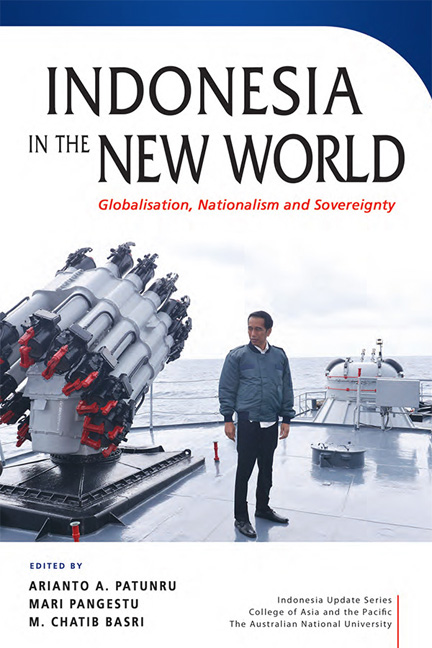Book contents
- Frontmatter
- Contents
- Tables
- Figures
- Contributor
- Acknowledgments
- Glossary
- 1 Challenges for Indonesia in the new world
- PART 1 Globalisation, Nationalism and Sovereignty: the Indonesian Experience
- PART 2 Nationalism in Practice
- 5 Feeding the bangsa: food sovereignty and the state in Indonesia
- 6 Nationalism, developmentalism and politics in Indonesia's mining sector
- 7 Who is afraid of economic openness? People's perceptions of globalisation in Indonesia
- PART 3 Impact of and Response to Globalisation
- PART 4 The Human Face of Globalisation
- PART 5 Navigating The New Globalisation
- Index
- INDONESIA UPDATE SERIES
6 - Nationalism, developmentalism and politics in Indonesia's mining sector
from PART 2 - Nationalism in Practice
Published online by Cambridge University Press: 08 June 2019
- Frontmatter
- Contents
- Tables
- Figures
- Contributor
- Acknowledgments
- Glossary
- 1 Challenges for Indonesia in the new world
- PART 1 Globalisation, Nationalism and Sovereignty: the Indonesian Experience
- PART 2 Nationalism in Practice
- 5 Feeding the bangsa: food sovereignty and the state in Indonesia
- 6 Nationalism, developmentalism and politics in Indonesia's mining sector
- 7 Who is afraid of economic openness? People's perceptions of globalisation in Indonesia
- PART 3 Impact of and Response to Globalisation
- PART 4 The Human Face of Globalisation
- PART 5 Navigating The New Globalisation
- Index
- INDONESIA UPDATE SERIES
Summary
The global mining boom, occurring roughly between 2003 and 2013, caused a frenzy of mineral extraction across Indonesia's resource-rich regions, such as Kalimantan, Sulawesi and Sumatra. During the boom years, Indonesia's central and regional governments enjoyed a huge boost in revenues as demand from China sent commodity prices soaring. But many policy-makers, activists and politicians became concerned that Indonesia's finite resources were being shipped overseas too quickly and too cheaply, and that not enough Indonesians were feeling the economic benefits of the minerals boom.
In response, President Susilo Bambang Yudhoyono's administration (2004–14) introduced Law No. 4/2009 on Mineral and Coal Mining (the 2009 Mining Law), which stated that mining companies must begin adding value to their mineral ores within five years of the law's enactment. The government's goal was to kick-start a downstream mineral-processing industry by forcing companies to smelt or refine their ores domestically. Then, in January 2014, the government went ahead and banned the export of unprocessed minerals (Minister of Energy and Mineral Resources Regu¬lation No. 1/2014). According to the regulation, value-adding activities in the mining sector would help to ‘increase the benefits of minerals for the people and for regional development’. Indonesia could then transition away from extracting and exporting cheap primary commodities, and instead produce and export higher-value mineral products.
The policy was primarily justified in nationalist terms. Without policies like the export ban, so the argument went, Indonesia would just continue selling cheap primary commodities to richer, more industrialised nations, and never move up the global value chain. The policy contributed to Indonesia's reputation as a country marked by ‘resource nationalism’, a term that describes the various ways in which state and non-state actors attempt to extract more value from, and exert more ownership over, their natural resource endowments. Conventional market-cycle theories sug¬gest that resource nationalism emerges in response to commodity booms, and then fades as commodity prices cool and resource-rich governments come under financial pressure (Wilson 2015).
- Type
- Chapter
- Information
- Indonesia in the New WorldGlobalisation, Nationalism and Sovereignty, pp. 90 - 108Publisher: ISEAS–Yusof Ishak InstitutePrint publication year: 2018

